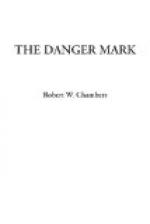Behind her streamed her gigantic shadow; behind her lay another shadow, cast by her soul and floating wide of it now. And it must never touch her soul again, God helping.
Suddenly her heart almost ceased its beating. Far away within, stirring in unsuspected depths, something moved furtively.
Her face whitened a little; her eyes closed, the lids fluttered, opened; she gazed straight in front of her, walked on, small head erect, lips firm, facing the hell that lay before her—lay surely, surely before her. For the breath of it glowed already in her veins and the voices of it were already busy in her ears, and the unseen stirring of it had begun once more within her body—that tired white, slender body of hers which had endured so bravely and so long.
If sleep would only aid her, come to her in her need, be her ally in the peril of her solitude—if it would only come, and help her to endure!
And wondering if it would, not knowing, hoping, she walked onward through the falling night.
CHAPTER XVII
THE DANGER MARK
Her letters to him still bore the red cross:
“I understand perfectly why you cannot come,” she wrote; “I would do exactly as you are doing if I had a father. It must be a very great happiness to have one. My need of you is not as great as his; I can hold my own alone, I think. You see I am doing it, and you must not worry. Only, dear, when you have the opportunity, come up if only for a day.”
And again, in November:
“You are the sweetest boy, and it is not difficult to understand why your father cannot endure to have you out of his sight. But is this not a very heavy strain on you? Of course your mother and Naida must not be left alone with him; you are the only son, and your place is there.
“Dear, I know what you are going through is one of the most dreadful things that any man is called upon to bear—your father stricken, your mother and sister prostrate; the newspapers—for I have read them—cruel beyond belief! But whatever they say, whatever is true or untrue, Duane, remember that it cannot affect my regard for you and yours.
“If I had a father,
whatever he might have done, or permitted others
to do, would not, could
not alter my affection for him.
“Men say that women
have no sense of honour. I do not know what
that sense may be if it falters
when loyalty and compassion are
needed, too.
“I have read the papers; I know only what I read and what you tell me. The rules that custom has framed to safeguard and govern financial operations, I do not understand; but, as far as I can comprehend, it seems to me that custom has hitherto sanctioned what disaster has now placed under a bann. It seems to me that the very men who now blame your father have all done successfully what he did so disastrously.
“One thing I know:
no kinder, dearer man than your father ever
lived; and I love him, and
I love his family, and I will marry his
son when I am fit to do it.”




